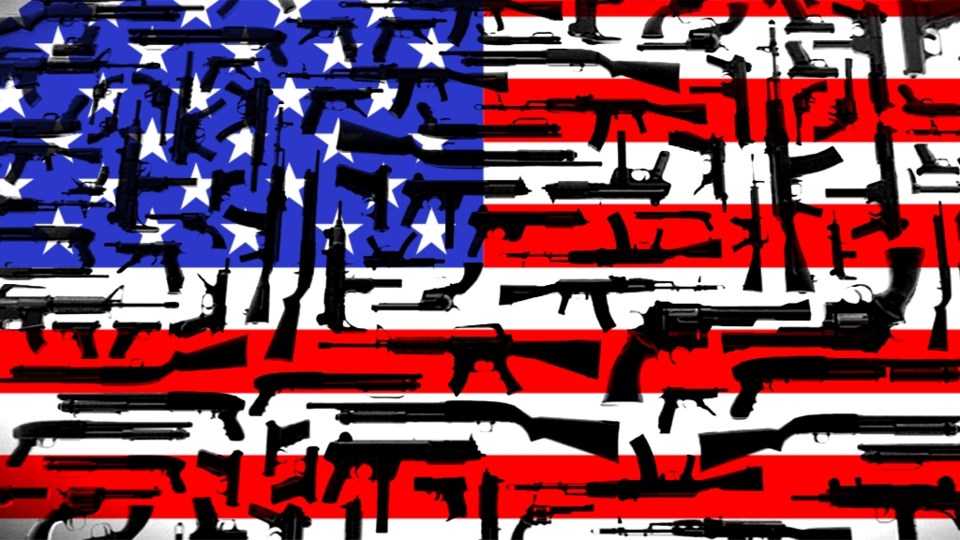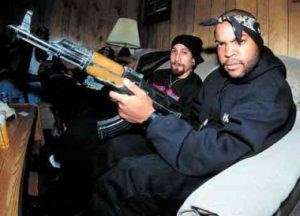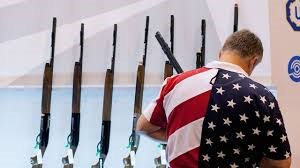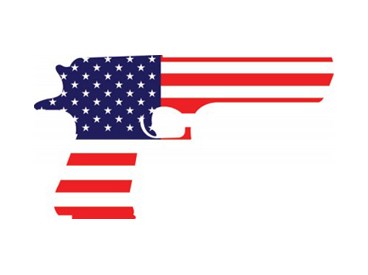
THIS IS A PART 1 IN A TWO PART SERIES ON GUNS IN AMERICA. STAY TUNED FOR PART 2, WHERE I'LL DISCUSS THE SOCIETAL ISSUES SURROUNDING GUN VIOLENCE.
My gun experience, based on who you're talking to, is either close to nil or extensive.
I've never shot a gun and I've never been shot at, though I have held two pistols in my hand at one time, and I have also had a pistol pressed against my stomach in the midst of a street robbery that relieved me of my favorite sheepskin coat.

In the first scenario, I was holding two pistols as my friend tried to convince me to help do security for an old-school rap group, that was a new rap group at the time.
I declined because I was at the party to have fun, and nothing about holding two pistols seemed like any fun. Besides, I've always been of the skinny, scrawny variety, and I'm sure two pistols would be noticeable on my girth-challenged frame.
Were there shootings at the party that night? You betcha, because that was the way parties ended back in the 80s, when flyers always had a "?" as the end time, because once a gun let off, that is when the music stopped, the crowd let out into the street and the DJ screamed "party over!"
Fast-forward to May 2014: A few days into digesting the massive story about the Elliot Rogers massacre, the night of that party popped into my mind as I thought about the timeline of gun violence and gun laws in America. But it also made me think about the societal failures of America then and how those failures are still very much connected to the conversation about guns and gun violence today.

The 1960s was a defining time in America and if you don't believe me, just ask CNN or watch their special series about that special decade. Its assassinations, social unrest and riots watermarked the decade as the time when we the country, fully grasped that it had a gun violence issue.
Part of the national shock and remorse of the 60s assassinations stemmed from America being shoved headlong into the reality of gun violence and the need to immediately grasp what it meant as a nation, that such a barbaric and uncivilized act could happen to people as beloved, as MLK or JFK and have those acts perpetrated by other Americans.
The gun control act dropped in 1968 and just like that, America officially recognized that it had a gun violence problem.
But the real problem wasn't the guns, it was the people.
The bigots and their institutionalized racism. The poverty and ghettos that were being created and the ensuing pathology of the people mired in those conditions. Those were the real issues behind the 60s surge of gun violence, when guns were a lot less prevalent than today, but the breakdown of the social fabric was still the root cause of why guns violence was on the rise.
Fast forward to May, 2014 and gun violence in America is even more out of control, but the latest massacre has ushered in a real reveal of how the social fabric of America has continued to erode and how gun violence is a by-product. And though decreasing access to guns would be a huge step towards reducing gun violence, it's by no means a panacea.
The cut and paste conversation, that's centered around gun control, is like a macro created in Microsoft Word. It gets triggered after each similar incident. Triggered after Sandy Hook. Triggered after Columbine.


Triggered after Virginia Tech. It prompted the documentary film maker Michael Moore to reply to a question about the killings, by saying "With due respect to those who are asking me to comment on last night's tragic mass shooting at UCSB in Isla Vista, CA -- I no longer have anything to say about what is now part of normal American life. Everything I have to say about this, I said it 12 years ago."
With connections to Hollywood, an upper middle class setting and the accompanying accoutrements such as a luxury German automobile and expensive german hand guns, the story of Elliot Rodger is steeped in sensationalism, which has become a core tenant of America's brand.
Yet his story has done far more than sell tabloid newspapers and make me tune into cable news, it's shed light on other very important issues. Complex issues that America needs to address in addition to access to guns.
This most recent massacre by twenty-two year old Elliot Rodgers has shown the interconnectedness of a few of America's big ticket, societal issues. The complex relationship between access to guns, racism, mental health, male entitlement and misogyny, has had it's curtain pulled back by the powerful, one-two punch of social media and twenty-four hour television news.
This is Part. 1 in a 2-part essay on gun violence in America.




